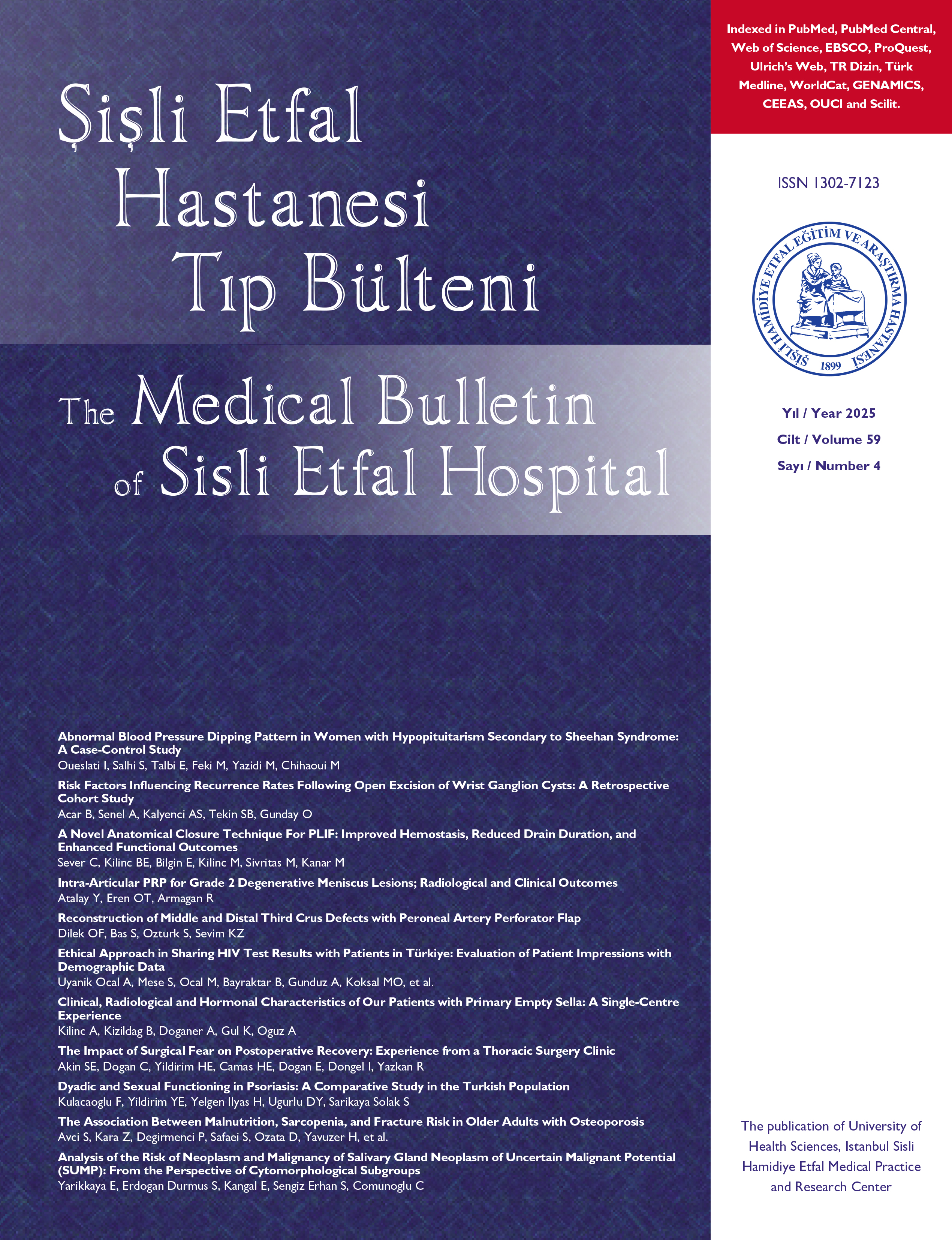
Candidal Infections in the Neonatal Intensive Care Unit: A Retrospective Observational Study
Gaffari Tunc1, Arife Toksoz2, Fatih Kilicbay31Department of Pediatrics, Division of Neonatology, Bursa Yuksek Ihtisas Training and Research Hospital, Bursa, Türkiye2Department of Pediatrics, Hatay State Hospital, Hatay, Türkiye
3Department of Pediatrics, Division of Neonatology, Sivas Cumhuriyet University Faculty of Medicine, Sivas, Türkiye
Objectives: The aims of this study were to evaluate the demographic characteristics, risk factors, mortality rates, and laboratory findings of infants with fungal sepsis in the Neonatal Intensive Care Unit (NICU).
Methods: This retrospective multicenter study included patients in NICU with Candida spp isolated in blood cultures between November 01, 2019, and September 01, 2022. The patients were evaluated in two groups as Group 1 infants with Candida albicans and Group 2 infants with Candida non-albicans positive blood cultures.
Results: Candida infection was detected in blood cultures in 57 of 3450 patients admitted to the NICU. A total of 57 infants included in the study. Candida infection was determined 1.6% of infants in the study population, and 57% of them were extremely pre-term infants. There was no significant difference between the two groups in terms of laboratory data. Normal vaginal birth was determined at a higher rate in Group 1. In Group 2, length of hospital stay, duration of total parenteral nutrition (TPN), and mechanical ventilation (MV) were determined to be longer. The mortality due to Candida fungemia was determined as 35%, and of these patients, 65% had an additional medical condition.
Conclusion: In accordance with the literature, this study showed that prolonged MV and longer TPN increased the incidence of fungal sepsis. Therefore, to decrease the fungal sepsis rate of NICU, shortening the hospital stay and effective screening programs are recommended.
Keywords: Candida spp., candidemia, fungal sepsis, neonatal intensive care unit, nosocomial infection
Yenidoğan yoğun bakım ünitesindeki kandidal enfeksiyonlar: retrospektif gözlemsel bir çalışma
Gaffari Tunc1, Arife Toksoz2, Fatih Kilicbay31Bursa Yüksek İhtisas Eğitim ve Araştırma Hastanesi, Çocuk Sağlığı ve Hastalıkları Ana Bilim Dalı, Neonatoloji Bilim Dalı, Bursa2Hatay Devlet Hastanesi, Çocuk Sağlığı ve Hastalıkları Kliniği, Hatay
3Sivas Cumhuriyet Üniversitesi Tıp Fakültesi, Çocuk Sağlığı ve Hastalıkları Ana Bilim Dalı, Neonatoloji Bilim Dalı, Sivas
Amaç: Yenidoğan yoğun bakım ünitemizde (YYBÜ) Candida spp. sepsisi nedeniyle takip ve tedavi edilen bebeklerin demografik özelliklerini, risk faktörlerini, mortalite oranlarını ve laboratuvar bulgularını retrospektif olarak değerlendirmeyi amaçladık.
Metod: Yenidoğan yoğun bakım üniterlerinde çok merkezli, retrospektif olarak, 1 Kasım 20191 Eylül 2022 yılları arasında, kan kültüründe Candida spp. üremesi olan hastalar çalışmaya alındı. Candida albicans(C.albicans) üreyenler (Grup 1) ve Candida Non-albicans üreyenler (Grup 2) şeklinde iki gruba ayrılarak incelendi.
Bulgular: Candida enfeksiyon sıklığı %1,6 olarak saptandı. İleri preterm bebeklerde ise %57 oranında saptandı. Grup 1de normal doğumun daha yüksek olduğu saptandı. Grup 2de ise hastanede kalış süresinin, Total Parenteral Beslenme (TPN) ve mekanik ventilasyon (MV) süresinin daha uzun olduğu saptandı. Ölüm oranı %35 olarak saptandı ve bu hastaların %65 inde ek anomali eşlik etmekte idi. Laboratuvar verileri arasında her iki grupta da anlamlı fark saptanmadı.
Sonuç: Sistemik Candida enfeksiyonunu önlemek için hamile kadınların vajinal kandidiyazis açısından taranması gerekir. Uzamış MV, TPN vb. fungal sepsis insidansını arttırır. Bunu önlemek için hastanede kalış süresinin kısaltılması ve etkin tarama programları önerilir. (SETB-2022-11-243)
Anahtar Kelimeler: Candida spp., kandidemi, fungal sepsis, yenidoğan yoğun bakım ünitesi, nozokomiyal enfeksiyon
Manuscript Language: English



















